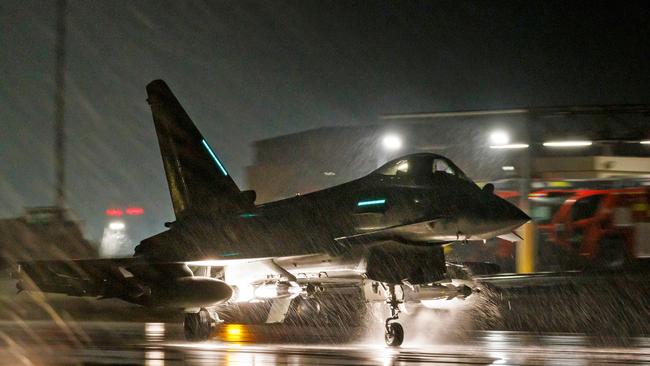US, UK launch strikes on Houthi sites in Yemen
The latest strikes mark the sixth time Washington has targeted the Iranian-back group.

The US and UK launched strikes against eight Houthi targets Monday, the Pentagon said, in the second major assault in an ongoing bid to stop the Yemeni rebel group’s attacks on ships transiting the Red Sea.
The strikes marked at least the sixth time the US has targeted the group, which is armed, funded and supported by Iran. In most instances, the US said it was launching self-defence strikes. Monday’s strikes aimed to prevent the group from future attacks.
The strike was aimed at underground storage and missile and air surveillance sites, the Pentagon said. An official in the Royal Navy said the attacks struck dozens of targets, including rocket launchers, missile depos, warehouses and radar sites.
The US and UK militaries conducted the attacks with support from Australia, Bahrain, Canada, and the Netherlands, the Pentagon said. President Joe Biden and UK Prime Minister Rishi Sunak spoke Monday afternoon, the White House said.
A Houthi official told The Wall Street Journal the strikes were less intense than the first round on January 11, which consisted of more than two dozen targets, and he said the group had received no reports of loss of life.
“We again acted as part of a coalition of like-minded countries committed to upholding the rules-based order, protecting freedom of navigation and international commerce, and holding the Houthis accountable for their illegal and unjustifiable attacks on mariners and commercial shipping,” the Pentagon said in a statement.
In the hours leading up to the coalition strikes, a U.S.-flagged and -owned heavy load carrier was targeted with a Houthi missile while sailing eastbound in the Gulf of Aden, British security consulting firm Ambrey said, while mariners were warned to avoid the area. Roughly 85 ships were sailing through the waterway to the Suez earlier Monday.
“We’ve been instructed to leave. The radio says there is an impending attack,” said Chun Guo, the captain of a China-operated liner moving more than 10,000 containers from Shanghai to Rotterdam, ahead of the US strike. “We’ll take the long route around Africa, two extra weeks.” In what they said was a response to Israel’s war against Hamas in Gaza, the Houthis began attacking commercial ships in the end of November, rattling global markets and up-ending international shipping routes.

Initially directed against Israeli-linked vessels, the attacks have become increasingly indiscriminate. The rebels have attacked vessels from container ships to tankers moving sanctioned Russian oil as the global shipping nexus complicates their ability to identify specific targets.
Last week, vessel traffic through the Suez Canal was down 34% compared with the end of November, according to data by Lloyd’s List Intelligence.
Though eager to protect global shipping, the Biden administration has been reluctant to respond too forcefully to the Houthis lest it trigger a war in the region, in part because of the group’s backing from Tehran, Western security officials and advisers have said.
After assembling a multilateral defensive coalition to protect seaborne traffic in December, the US, Britain and key allies on Jan. 3 issued what amounted to an ultimatum to the group to cease its attacks.
On Jan. 11, a U.S.-led coalition launched scores of munitions at more than two dozen sites, targeting radar and air defence systems and drone and missile storage and launch sites. The U.S. conducted several strikes since, targeting sites the U.S. said were being prepared to attack passing ships. In one instance, a U.S. fighter aircraft shot down an antiship cruise missile shot by the Houthis toward the USS Laboon, a destroyer.
The U.S. has sought to confiscate weapons headed toward Houthi-controlled parts of Yemen. In one episode hours before the Jan. 11 strike, two Navy SEALs fell overboard while attempting to board a dhow off the coast of Somalia carrying Iranian-made missile components bound for Yemen’s Houthi rebels, the Pentagon said. Navy Special Warfare Operator 1st Class Christopher J. Chambers, 37, and Navy Special Warfare Operator 2nd Class Nathan Gage Ingram, 27, were declared dead on Sunday.
Last week, the Biden administration designated the Houthis as a global terrorist group, a move intended to stanch the funding for the Houthis by sanctioning its backer, Iran.
The Pentagon has declined to provide any detailed assessment of the effectiveness of its campaign, and Houthi attacks haven’t subsided. One Pentagon official estimated the U.S. had destroyed about 20% of the Houthis’ military capabilities. The Houthis have intelligence about coming strikes from Iran, an Iranian official said, and were moving missile launchers around.

“We’ve got sharp shooters on our vessels because they are effective in stopping small boats catching up with the ship and the bad guys climbing up,” said Nils Haupt, a spokesman for German container carrier Hapag-Lloyd AG. “We are sending our ships through the Red Sea, but there is danger more widely, in the Gulf of Aden.”
On Monday evening, European Union foreign-policy chief Josep Borrell said foreign ministers had agreed in principle to send a naval mission to the Red Sea to help safeguard commercial shipping from Iran-backed Houthi attacks.
EU officials have said in recent days that the mission would consist of at least three vessels and include support from a number of EU countries, including France, Germany, the Netherlands, Belgium and Greece.
The mandate for the mission will include the ability to fire at incoming missiles or drones attacking an EU vessel or merchant shipping. However it won’t include the ability to fire at
Houthi land-based infrastructure or to pre-emptively destroy missiles that haven’t yet been deployed, as U.S. and U.K. forces have been doing.

A decision still needs to be formally taken by unanimity, which is expected in February. It isn’t clear how soon EU mission vessels would then arrive in the area, but officials have said they would need to move as fast as possible.
The leader of the Houthis, Abdul-Malik al-Houthi, said in a televised speech that the U.S. strikes wouldn’t deter the group from attacking ships and confronting the U.S.
Biden said last week that the U.S. would continue to target Houthi weapons until the attacks on shipping stops. After a reporter asked whether the strikes were working, the president responded: “Are they stopping the Houthis? No. Are they going to continue? Yes.”
Houthi fighters overthrew the Yemeni government in 2014, leading Saudi Arabia and other Arab nations to mount a military campaign against the rebels. Months of talks between Saudi Arabia and the Houthis have produced a road map that the U.S. hopes could lead to resolution of the conflict.
Laurence Norman and Saleh Al-Batati contributed to this article
The Wall Street Journal



